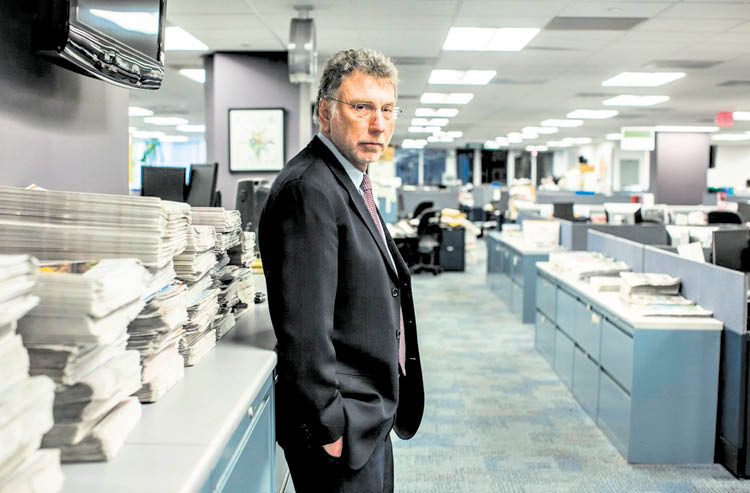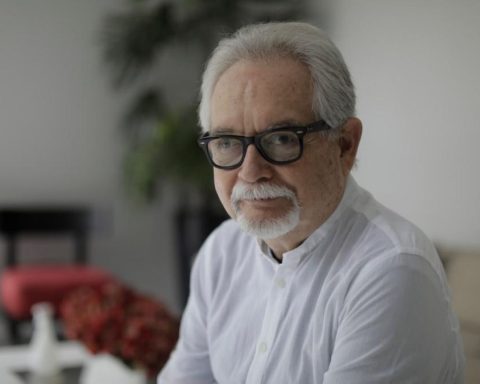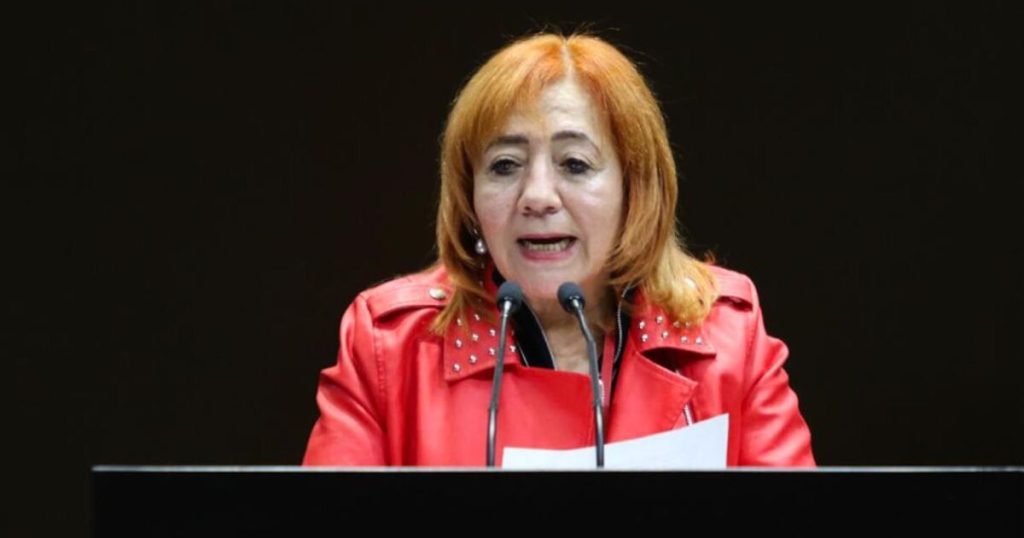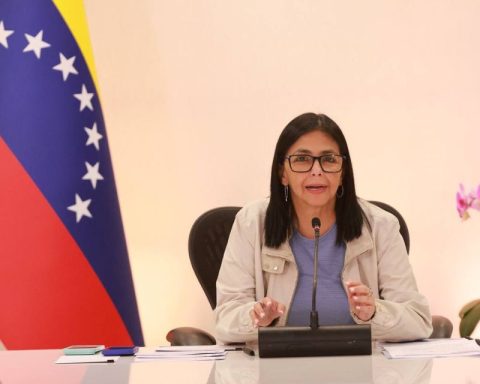Baron participated in the 80th General Assembly of the Inter-American Press Association. He is shy, just like actor Liev Schreiber’s portrayal of him in Spotlight, a film about the ecclesiastical sexual abuse investigation he led from the Boston Globe. “That actor is taller, more handsome, younger. “I’m not complaining,” he says before starting this interview.
It seems that journalism is no longer about informing people, but about entertaining them. Isn’t that a contradiction to the purpose of this office?
Several people speak of a contradiction. However, I speak of a balance. Obviously, we have to write or publish things that interest the public, and tell the stories in an interesting way. But we also have to stay true to our principles to fulfill our mission of seeking the truth, uncovering the truth, and publishing the truth. Principles always come before traffic. If we violate our principles, we will undermine our brand, our institution, and they will abandon us.
Before, journalists had to have a command of language above average usage. Are there new journalistic skills that communicators should have now?
What we should do is adapt to the changes. And better than that, embrace the changes and understand how they will change our task. If information consumption is changing, we have to change.
Normally, the journalist with digital skills boasts that part of them is having a permanent opinion on social networks.
Each person has the right to their own brand, but they should think that their own brand should not conflict with the brand of the institution where they work.
The majority of journalists who work in these institutions wanted to affiliate with the institution to improve their brand personally, precisely thanks to the media’s external reputation. They should think about what they committed to when they entered an institution. The journalist’s job also involves covering activists, not becoming one of them…
What is the border between the journalism And activism?
There is no concrete definition of that. What we have to maintain is objectivity. What is objectivity? It is not the false equivalence. Objectivity is a centuries-old principle that says we have to recognize that we all have our pre-existing opinions, our prejudices. When we start investigating the facts, we have to keep an open mind, because our opinions may not be correct. We don’t know everything. So, we have to investigate the facts honestly, honestly and independently. As if we were scientists. If there were a scientist who relied only on facts that supported his theories and ignored contrary facts, he would commit scientific fraud. So, doing that in journalism, wouldn’t it be an intellectual fraud? The purpose is not to avoid the truth; is determining the truth. Our pre-existing views should not be a stumbling block.
Do you feel, generationally, that it is now more difficult to accept the possibility of being wrong?
I don’t want to blame only the young people. However, I think many people now have very strong opinions. I understand that you see many problems in society, many challenges to democracy, to freedom of expression, but that has always been the case. Only now, with algorithms, everyone seeks to be inside their bubble and have what they think confirmed.
They grew up with social media. I don’t.
They are used to expressing their opinions on social networks. They are used to expressing themselves all the time and communicating with their friends that way, and they feel entitled to take advantage of social media. It’s a completely different point of view from mine.
As director of the Post, were you able to reach a point of agreement regarding the claim of journalists who, contravening internal rules, attempted to post personal opinions on social networks?
In an editorial we cannot be a random grouping of individuals. We have to be an institution. We should share norms, principles, values, practices. It is not enough to share a building that accommodates journalists. Working in a newsroom should mean one thing: that we have a common set of standards. Of course, each person has the right to work wherever they want. A journalist who works in a newsroom where he or she does not agree with the rules has two options: one option is to pressure the newsroom leadership to change the rules; The second option is to leave that newsroom and work in a place where you can feel more comfortable. Or go where there are no rules.
There are many journalists who have, in effect, made their own brand and done well.
Alright. We have freedom of expression and I believe in it. If they have been successful, perfect. I wish you good luck. If they have found a better model, perfect. I don’t have any problem. We have always had apology journalism, it started with ideological pamphlets. Each person has the right to select their path, just as each institution has the right to select its own.
The word ‘institution’ seems to have become a dirty word. If people thought more about democracy, they would understand that to maintain a democracy we need the pillars of a democracy. What are the pillars of a democracy? They are the necessary institutions: the courts, the Congress, the Legislature, the Executive and an institution independent of all that, which is the press. That’s the idea.
Now that there is fake newsthat there is pamphlet journalism, that there is artificial intelligence, what would be the new skills that citizens need to discern what kind of messages they are consuming?
What we need is media literacy. Information consumers must investigate more deeply their sources of information, who they are, where their resources come from, who is conducting that research. Does that organization have the capacity to do an investigation? Do they have experience? Do they have a track record of uncovering the truth, of telling the truth, of verifying information? Do you have a code of ethics? Do they comply?
Each person has their own opinions. Opinions are very cheap, they cost nothing, because they were born with us. Serious and honest information is expensive. Journalism costs. There are many people now who confuse opinions with facts. There is a big gap between them.
TESTIMONY. Baron dedicated his new retirement status to recounting his experience when Jeff Bezos, owner of Amazon,
He bought the Washington Post and then Donald Trump won the presidential election. Tremendous combination. The book is called Facing Power.
Journalism is expensive. Due to the Internet, advertising has declined. People are getting used to everything for free, social networks are confused with information. How do we get out of this?
If I knew how, I’d be selling my services. The media environment now is very very difficult and is getting even more complicated every day. What we cannot do, in the meantime, is abandon our principles for this reason.
The competition is unfair. In X there is a supreme editor who controls everything, but if someone is defamed, there is no criminal person responsible, as there is in the press.
In the US there is a lot of resistance, particularly from technology platforms. There is a law that gives them almost immunity over publications on their platforms. The traditional media would suffer the consequences if we slandered, they would not. That should change. If a technology platform manipulates its algorithm to increase the spread of a post, they should suffer the consequences. They are the largest companies in the world and make more money than others because they have protection, while traditional media, which are interested in reporting truthfully, do not have any.
What would you say to those who spend hours in front of their screen, so that they understand the importance and need to be informed?
I think we should no longer think about the press; we should think about human progress. What do we need to progress as human beings? We need the facts. Information consumers should think more deeply about how we are going to determine the facts. Because now we are in a dangerous moment, there is no common consensus. We cannot agree on the facts. And it’s worse than that, because we can’t agree on what constitutes a fact and how we can determine it. This happens because all the elements that we had used in it before have been devalued. What were they?: education, experience, knowledge and, above all, evidence. What we see with our own eyes, what we hear with our ears has been devalued by overinformation. The public should think deeply about what the consequences of not being able to determine the facts will be if we continue to confuse beliefs with facts.
It is a dangerous time for the press. It is a dangerous moment for democracy. It is a dangerous time for society. It is impossible to progress without a common set of facts.
Power collision: Trump, Bezos and The Washington Post, the title of the book Baron wrote in his recent retirement. Seven months after assuming management of the Post, he learned that it had a new owner, none other than Amazon boss Jeff Bezos. He acknowledges that Bezos never interfered editorially in the eight years he ran the Post, between 2012 and 2021. Rather, President-elect Donald Trump, who said journalism was the lowest form of humanity, held Amazon responsible for the Post’s acuity in covering his government. Trump called Baron to complain—in every tone imaginable—about what the paper said. In one of those calls, Trump said that an article had portrayed him as a child and uttered words that Baron never thought he would hear from the president of the United States. He said, “I am not a child.” The last Pulitzer of his career was obtained with the Washington Post’s coverage of the assault on the Capitol, induced by Trump in January 2021.
What do you think is going to happen in November in the United States?
I cannot predict the results. According to the polls, they will be very close elections. We have always had close elections in recent decades. You have to remember the 2000 elections. I was editorial director of a Miami newspaper. In Florida there was a difference of only 537 votes between Bush and Gore. We can return to a scenario like this.
Yeah trump is defeated, do you think he will accept the results?
No, he will never accept the results. He has not accepted them even when he won in 2016: he said he had won with a wider margin. Not a good winner. He’s not a good loser. There are several ways to challenge the results legally, but he uses other ways. There is an atmosphere in the United States that I would describe as unrest, because many people think – rightly – that he is going to continue inciting his followers. We have already seen violence. On January 6, 2021, he incited an insurrectionary mob that stormed the Capitol. They came in shouting that they wanted to hang the vice president of the United States just for having fulfilled his constitutional role. Now, Trump says that those people prosecuted, who are now in the
prison, they are political hostages, that what they did was nothing more than a tourist visit. There is a lot of fear about what may happen after the elections.
RECOMMENDED VIDEO















